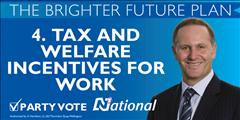The campaign for New Zealand’s 2011 General Election on November 26 has started. The jostling and jockeying, shaking hands and kissing babies, meetings and protests, promises and bickering, the battle of ideas for the hearts and minds and more particularly the votes of New Zealanders has begun!
It is clear that National intends to focus on aspiration, while building on its record in Government. Labour however, seems intent on reviving class warfare to protect enslaved workers from the ravages of the capitalist elite.
The problem for Labour is that few people buy into that story nowadays and their timing of a negative campaign could not have been worse for a country that has had one hell of a bad news year with earthquakes, a mine disaster, and now a shipwreck.
The Rugby World Cup victory at last had delivered some light relief and good news, and negativity will be the last thing that many voters want.
Expensive error
 Labour also made a strategic error in their opening address by exposing their ugly side for all to see. In describing National’s tax cuts and the ‘trickle down’ theory as “the rich pissing on the poor,” Labour has lost sight of the fact that aspiration for a better life is a key motivator of most New Zealanders.
Labour also made a strategic error in their opening address by exposing their ugly side for all to see. In describing National’s tax cuts and the ‘trickle down’ theory as “the rich pissing on the poor,” Labour has lost sight of the fact that aspiration for a better life is a key motivator of most New Zealanders.
This ‘hate the rich’ philosophy is, judging by Michael Cullen’s “rich prick” comment when he was Deputy Prime Minister, deeply held within the modern Labour Party.
It is an incredibly destructive attitude and is no doubt one of the reasons that so many of New Zealand’s entrepreneurs and go-getters have left the country; and why our remaining high achievers are more reticent than ever to speak out.
It also shows that the Labour Party has failed to understand the fundamental yearning of working class families to get ahead under their own steam, rather than having to rely on plundering politicians to redistribute the wealth of others.
Do not get me wrong. I am not saying that the well off should get a free ride.
They would not expect that anyway.
I think it is fair to say that they will be offended by Labour’s comments.
They will also probably take issue with Labour and the Greens saying the rich do not pay their fair share of tax, when the top 10% of households pay over 70% of all income tax.
Labour’s derision of the rich belies the fact that many of New Zealand’s (and indeed the world’s) richest have come from struggling working class families.
Rag to riches
Most would have had parents who encouraged them to succeed and achieve greater rewards than they had ever had the opportunity to enjoy.
Owen Glenn is one such high achiever who came from a working class immigrant background. Leaving Mt Roskill High School at age 15 after gaining his School Certificate, he learnt to recognise opportunity and chase it.
He is now one of New Zealand’s richest men with a successful international business and a history of global philanthropy that dates back over 30 years.
 What about Labour’s interest-free student loans?
What about Labour’s interest-free student loans?
I wonder how many graduates look at the size of their loan in disbelief and wonder whether they will ever be able to afford to buy a house or have a family, let alone find the money to pay back the loan.
Even Labour’s 20 hours free childcare has a downside.
How many parents have been persuaded to give up their children, who at the age of three, are little more than babies, into the care of the state, instead of raising them within their own families?
Voters will be asked to decide which of the main parties should form our new government on November 26.
Backward moves
As Mr Glenn pointed out in his article, Leadership Matters, National and Labour are pushing agendas that are poles apart.
On the one hand, National is saying it wants to grow New Zealand’s economy by making it more competitive through investing in education and infrastructure, cutting red tape, streamlining compliance and reducing government spending.
On the other hand, Labour is pushing the politics of division by substantially penalising some New Zealanders through increasing the top rate of income tax, introducing a Capital Gains Tax and pushing the crucial agricultural sector into the expensive Emissions Trading Scheme years ahead of schedule.
In conjunction with this, they are planning to give huge powers to their union supporters, firstly by establishing a powerful Workplace Commission of political appointees to control industrial relations in New Zealand and secondly by imposing binding Industry Standard Agreements on all businesses that will dictate pay and conditions – even if employees and employers do not want it.
This policy will effectively pass control of businesses away from the owners who have risked their capital and devoted their lives to making their enterprises succeed, to the unions.
In searching for an election circuit breaker, Labour has pledged to raise the retirement age from 65 to 67 but this policy promise is more form than substance since it is not scheduled to begin until 2020!
The Maori Party meanwhile wants the age of retirement for Maori to be lowered to 60 and they want that policy to begin right away!
With politicians driven to disclose what their real agendas actually are, don’t you love election campaigns?
The above is the edited version of the views expressed by Dr Muriel Newman, Director of the New Zealand Centre for Political Research, in her web-based free weekly Newsletter, NZCPR Weekly. For full text, visit www.nzcpr.com






